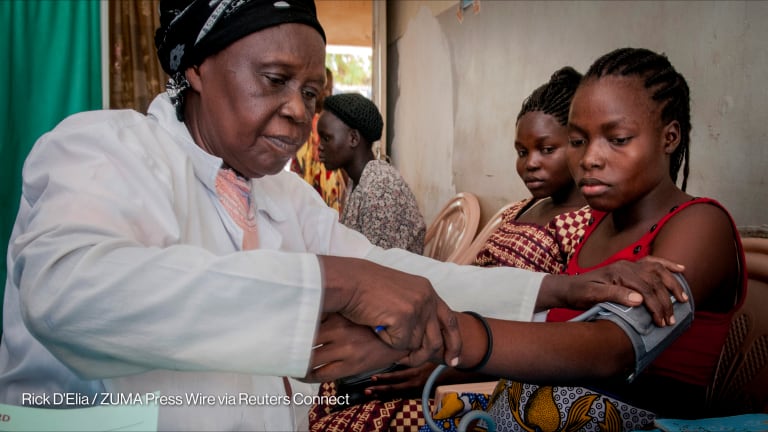
CANBERRA — Lack of child care is causing Fijian families stress and costs business $1,000 Fiji dollars ($465) per employee a year, a new International Finance Corporation report has found.
The report, released in May on the business case for employer-supported child care in Fiji, revealed that lack of child care creates barriers for women entering the workforce and costs employees over 12 days a year in lost productivity. Just 8% of parents with preschool age children involved in the study use a child care service.
And the findings have sparked action by the Fijian government.
“The Fijian government recognizes the significance of this report and has taken a proactive step with the recommendation for a national taskforce on early childhood,” Parveen Kumar Bala, the Fijian minister for employment, productivity, and industrial relations explained at the launch.
“Many parents are simply making do with whatever arrangements are available to them.”
— Sarah Twigg, gender and private sector specialist, IFCChaired by the Ministry of Women, Children and Poverty Alleviation, the taskforce is already underway. Traditional safety nets of grandparents or community support are no longer feasible, creating barriers for women to enter and remain in the workforce, Bala explained.
IFC intends to be one of the members of the proposed taskforce and will work together with key government ministries to establish the scope and objectives further. But Sarah Twigg, a gender and private sector specialist at IFC, said that it is an important step that has proven successful elsewhere.
More news from the Pacific:
► Niue, a tiny island nation in the Pacific, is ADB's newest member
► Small island states turn to innovation to build climate resilience
► Women on Tanna respond to lack of political will on climate change
“In Sri Lanka in 2018, there was a similar gap in terms of the policy and regulatory framework for child care services, and the prime minister set up a taskforce to spearhead the development of regulations and incentives for providing quality child care services,” she told Devex.
”It was a move that led to some real changes — for example amending the rules for maternal and parental leave, drafting national guidelines for child day care centers and investing in establishing 2000 daycare centers nationwide.”
Demand in Fiji is high — access and affordability is creating barriers
In Fiji, few companies provide any types of dedicated support for working parents. Understanding the demand and the barriers was an important starting point in understanding child care needs and opportunities in Fiji, Twigg said.
The IFC report surveyed employers and employees of seven companies in addition to the Fiji government. It found that 60%-75% of respondents would make use of a child care center if one was available. There was a high demand for quality, affordable, and accessible child care services in Fiji — not currently available for all working parents.
The tradition in Fiji has been for family or community members to care for children. But as the population in urban centers grows, young parents are increasingly distanced from traditional village and family support structures. They are increasingly relying on distant relatives or untrained babysitters to care for their children.
“Many parents are simply making do with whatever arrangements are available to them,” Twigg said.
The report noted concerns from parents with the current arrangement — two-thirds were concerned about their children’s safety while they are at work, and more than half were worried about the health and nutrition of their children. Some even commented that they did not always know where their children were during the day, concerned they may be exposed to alcohol or drugs.
For parents that did have care, less than a third had a reliable back up arrangement if their regular caregiver falls through — leading to high rates of absenteeism in the workplace as well as stress and anxiety among working parents who needed extra time off.
But with the current child care system identified in the report as being too costly for many families, there are little alternatives for working parents without national reform or private sector employees offering on-site care.
Making child care more accessible
Even before the announcement of the taskforce, Fiji was already making important steps to reduce barriers for working parents. In January, it increased paid maternity leave, paternity leave, as well as family leave entitlements. And in Fiji, the right to early childhood and primary education is actually embedded in the constitution.
“There are measures in place for children over 5, but there is a real gap when it comes to children under 5,” Twigg explained.
“Workers in the early childhood care and education sector are often majority women, so this also creates a real opportunity to create more quality jobs for women in Fiji.”
— Sarah Twigg, gender and private sector specialist, IFCCollaboration among the government, the private sector, and the child care sector, said Camille Funnell, deputy head of East Asia and Pacific communications at IFC, will be key to increasing the supply of quality early childhood care and education services in Fiji — and improving the support available for parents.
For the private sector, there are a range of recommendations to better support access to child care — and to improve business outcomes. Recommendations range from at-work family support networks to subsidies for child care costs and even free or subsidized child care centers at or near the worksite.
For the Fijian government — the largest employer in Fiji — the report recommends it establish the policy and regulatory frameworks that set national priorities for early childhood care and education, systems for regulating and monitoring the quality of such services, and addressing funding and resourcing of services. And this is likely to be scoped as part of the taskforce objectives.
“There are many examples from other countries of the government working together with the private sector to increase the supply and affordability of child care services,” Twigg said. “We are hoping to learn from these to identify promising approaches that could work in Fiji.”
Economic impact
The economic argument for a better child care system is important in Fiji to progress national reform. Parents have more income, more women are in the workforce, and employers do not suffer from loss of productivity.
“In a country where child care services are limited for parents, any moves to expand child care services means more jobs for people,” Twigg said. “We know from other countries that workers in the early childhood care and education sector are often majority women, so this also creates a real opportunity to create more quality jobs for women in Fiji.”
Where companies set up on-site child care facilities, these can either be directly operated and managed by the business, outsourced to an external child care provider, or provided as part of a consortium with other local businesses to share the costs and risks associated with doing so.
In all of those cases, these services will create new jobs. But what is important moving forward, Twigg said, to achieve the best economic and social outcomes through a child care system is to get the model right.
“What IFC has learned is that there is no one size fits all approach and it can take time to work out the best approach that suits a country and its people.”








